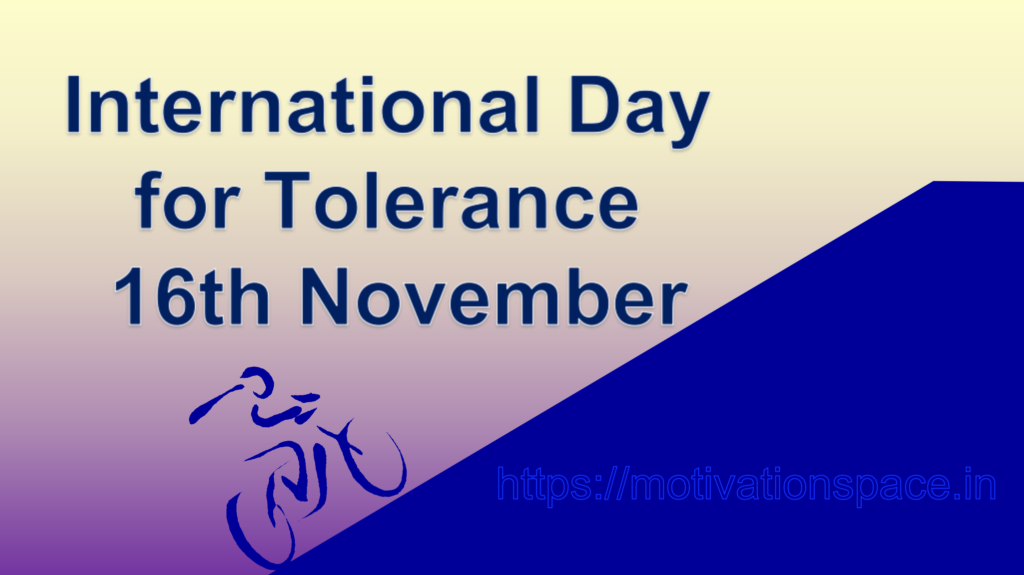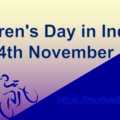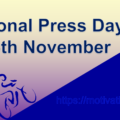Contents of this article
The International Day for Tolerance, observed annually on November 16th, serves as a global reminder of the essential need for tolerance, understanding, and acceptance in today’s diverse world. This day was established by the United Nations in 1996 to promote and encourage tolerance among nations and peoples, with the aim of fostering peace and stability in a world often marked by divisions and conflicts.
Tolerance is a fundamental principle that underpins human rights and human dignity. It goes beyond mere acceptance of differences; it involves respecting, appreciating, and valuing diversity in all its forms, whether it be in terms of race, religion, culture, nationality, gender, or any other characteristic that defines an individual.
The Historical Context of Tolerance
The concept of tolerance has a long history that spans various cultures and eras. It has been a key tenet in many philosophical, religious, and ethical traditions. For example:
The Enlightenment:
In the 17th and 18th centuries, European philosophers like John Locke championed the idea of religious tolerance and the separation of church and state. They believed in the importance of tolerance as a means to prevent religious conflicts.
Human Rights:
The Universal Declaration of Human Rights, adopted by the United Nations in 1948, explicitly recognizes the importance of tolerance. Article 1 of the declaration states, “All human beings are born free and equal in dignity and rights. They are endowed with reason and conscience and should act towards one another in a spirit of brotherhood.”
Religious Traditions:
Many religious teachings also emphasize tolerance. For instance, the Quran encourages respect and tolerance towards people of different faiths, while Christianity preaches the importance of loving thy neighbor.
The Significance of International Day for Tolerance
The observance of International Day for Tolerance carries several important messages:
Promotion of Peace:
Tolerance is a crucial tool in preventing conflicts, promoting peace, and achieving stability on a global scale. When societies embrace tolerance, they are more likely to find peaceful solutions to disputes and disagreements.
Respect for Human Rights:
Tolerance is intrinsically linked to human rights. It involves recognizing and respecting the rights of all individuals, regardless of their background or beliefs.
Cultural Diversity:
The day celebrates the richness of the world’s cultures and traditions. Tolerance is not about erasing differences but embracing them and learning from one another.
Empowerment of Marginalized Groups:
Tolerance is especially vital for marginalized and vulnerable groups, as it can help protect their rights and ensure they are treated with fairness and equity.
Fostering Social Cohesion:
In diverse societies, tolerance is a cornerstone for social cohesion. It enables people from different backgrounds to live together harmoniously and collaborate for the greater good.
Promoting Tolerance in Today’s World
In an increasingly interconnected and multicultural world, promoting tolerance is more important than ever. Here are some ways to foster tolerance in your own life and community:
Education:
Encourage education about different cultures, religions, and worldviews. Learning about others’ beliefs and practices can dispel stereotypes and prejudices.
Interfaith Dialogue:
Engage in interfaith dialogue and discussions. These conversations can help bridge gaps and build understanding among people of different religions.
Cultural Exchange:
Participate in cultural exchange programs, whether by traveling or connecting with people from diverse backgrounds in your own community.
Challenging Stereotypes:
Don’t be afraid to question and challenge stereotypes and biases, whether they exist within yourself or in your community. Promote open conversations about these issues.
Promote Inclusivity:
In schools, workplaces, and communities, advocate for policies and practices that promote inclusivity and celebrate diversity.
Volunteer and Advocate:
Get involved with organizations and initiatives that work toward tolerance and social inclusion. Support efforts that address issues related to discrimination and intolerance.
Foster Empathy:
Encourage empathy by placing yourself in others’ shoes and trying to understand their perspectives and experiences.
The Power of Tolerance
Tolerance is not a passive act but an active and deliberate choice to embrace diversity and promote understanding. It is a powerful force that can break down barriers, prevent conflicts, and create a more inclusive and peaceful world. By celebrating International Day for Tolerance, we reinforce the idea that diversity is a strength, not a weakness, and that our shared humanity should be a unifying force that transcends our differences. In a world facing numerous challenges, the practice of tolerance is a beacon of hope, offering us the path to a more harmonious and interconnected future.
UN Declaration of Principles on Tolerance (1995):
The International Day for Tolerance finds its origins in the UN Declaration of Principles on Tolerance, which was adopted by member states on November 16, 1995. This declaration established a comprehensive framework for promoting and protecting tolerance at the individual, community, and societal levels. It emphasized the importance of fostering mutual understanding and respect among different cultures, religions, and ideologies.
Proclamation of the International Day for Tolerance (1996):
On December 12, 1996, the United Nations General Assembly adopted a resolution that officially declared November 16th as the International Day for Tolerance. This annual observance aimed to raise awareness about the value and importance of tolerance while promoting understanding among diverse cultures and communities.
Promotion of Human Rights and Fundamental Freedoms (2005):
The importance of tolerance in relation to the promotion and protection of human rights and fundamental freedoms was reaffirmed by the United Nations General Assembly in 2005. This underlined the interconnectedness between tolerance, human rights, and peace.
UN Efforts to Combat Intolerance and Discrimination:
The United Nations has continued its work in the area of combating intolerance and discrimination through various initiatives, including programs and activities led by the United Nations Educational, Scientific and Cultural Organization (UNESCO) and the United Nations Alliance of Civilizations (UNAOC). These efforts aim to promote dialogue, understanding, and respect among different cultures, religions, and beliefs.
UNESCO’s Role in Tolerance Education:
UNESCO has played a significant role in advancing tolerance education worldwide. Through its educational initiatives, it has sought to instill values of tolerance, diversity, and respect among young people. The UNESCO-Madanjeet Singh Prize for the Promotion of Tolerance and Non-Violence is one example of how the organization recognizes individuals and institutions making notable contributions in this area.
Theme-Based Observations:
Each year, the International Day for Tolerance is celebrated with a specific theme that reflects the current global context and challenges. Themes have included “Promoting Tolerance and Reconciliation,” “Tolerance and Non-violence,” “Tolerance and Peace,” and others, addressing various aspects of tolerance and the broader mission of the United Nations.
Conclusion for International Day for Tolerance
The International Day for Tolerance serves as a reminder of the universal values of tolerance, respect, and understanding that the United Nations and the global community uphold. It emphasizes the need for nations and individuals to promote tolerance in their daily lives, fostering an environment where diversity celebrated, and discrimination actively countered. By commemorating this day, the international community aims to create a world in which all people can coexist peacefully and harmoniously, regardless of their differences in culture, religion, race, or beliefs. Feel free to contact us for anything about the contents of this website.


